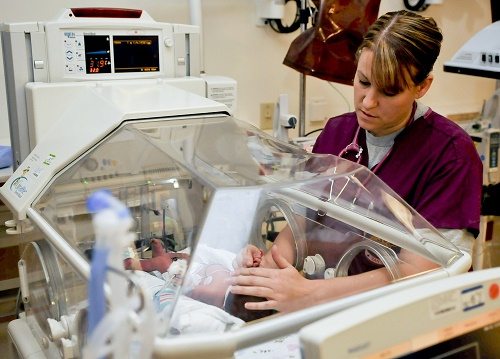IMAGE SOURCE: Pixabay, public domain
About 40,000 infants are born below the normal weight each year, according to the National Association of Neonatal Nurses (NANN). Neonatal nurses are the nurses who provide care to these babies and other newborns that are experiencing issues. In order to become a neonatal nurse, you will need to become a registered nurse (RN). There are also options for furthering your career in the neonatal field though furthering your education and attaining different certifications.
Education for Neonatal Nurses
The first step to becoming a neonatal nurse is to become an RN. RNs need to take the NCLEX-RN which requires either an associate’s degree in nursing or a Bachelor of Science in Nursing (BSN). Having your BSN will prepare you more for the exam and can help you move up in the nursing community.
As a RN, you are going to need to work in a hospital, specifically one with a neonatal intensive care unit (NICU) in order to gain experience. NANN recommends you work at this level for at least two years to gain the hands-on skills neonatal nurses need to care for infants. To further your education, you can choose to pursue either a Neonatal Clinical Nurse Specialist program or a Neonatal Nurse Practitioner (NNP) program. These programs will help you learn how to save the lives of at-risk pre-term and full-term babies and give them the care they require. You will also learn how to help families during this stressful time. Aspiring NNPs could pursue a Doctor of Nursing Practice (DNP) degree program, which isn’t required, but the American Association of Colleges of Nursing (AACN) is pushing for doctorates to become a requirement. Whichever program you choose to pursue should have course curriculum that cover embryology, neonatal physiology, and neonatal pharmacology.
The recommended units to gain experience in are: pediatric nursing, maternal-child nursing, well baby nursing, and labor and delivery nursing.
Certification Options
While you don’t need a certification to work in a NICU, if you want to have options to advance to higher-level positions, you may want to pursue a certification. The two main options for certification are the critical care neonatal nursing certification (CCRN) via the American Association of Critical Care Nursing and the RNC Certification for Neonatal Intensive Care Nursing (RNC-NIC) via the National Certification Corporation. These certifications are not required but will prove to employers that you possess the experience and knowledge to provide care for your patients.
The CRRN has two different requirement options. The faster option is to practice as an RN or advanced practice registered nurse (APRN) caring for neonatal patients for at least 1,750 hours over a period of two years, although at least 875 of those hours will have to be within the most recent year. A less intense option is to have 2,000 hours of direct care of neonatal patients as an RN or APRN for at least five years. In this option, only 144 of those hours must be from the recent year.
The RNC-NIC path requires two years of experience as an RN with a minimum of 2000 hours, though those hours can be directly related to patient care or through education, administration, or research. As for recent activity, the only time-sensitive requirement is employment in the specialty within the past two years. Regardless of which certification you choose, these both have to be renewed every four years.
Other certifications NICU nurses should obtain include Basic Life Support, Advanced Cardiovascular Life Support and Neonatal Resuscitation Program.
Caring for Neonatal Patients
While the neonatal period refers to the first month of life, neonatal nurses may be caring for their patients for months and even up to two years. Most neonatal nurses work in NICUs, where critical care is required around the clock. NICU nurses typically work 12 hour shifts so their patients are constantly monitored. NICUs are considered level three nursing care, because these infants either have serious medical conditions and/or were born prematurely. NICU nurses not only monitor the newborn’s health and administer medications but also are responsible for changing diapers and calming upset babies.
Another important duty of a neonatal nurse is to work with the infant’s family. Emotions can be high, and strong communication is key to helping keep the family calm and less stressed. They need to help parents and other family members understand what is going on with their newborn and walk them through how to care for them.
Not only is the work of neonatal nurses emotionally rewarding, but it is also financially rewarding, with a salary of up to $96,187, according to Payscale.

